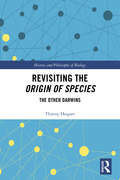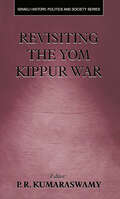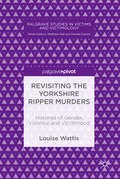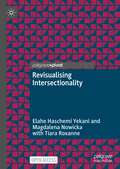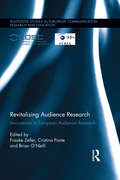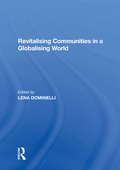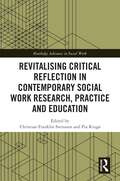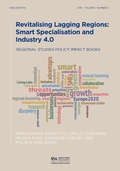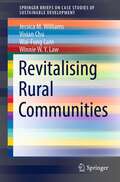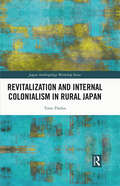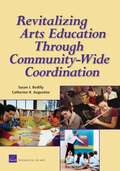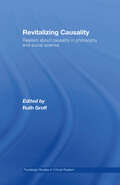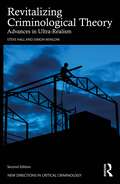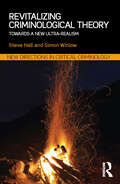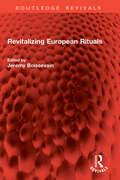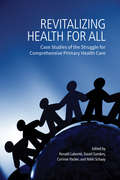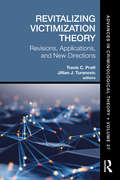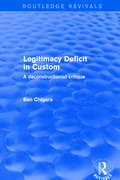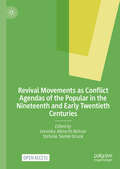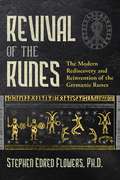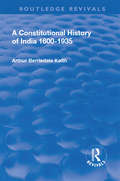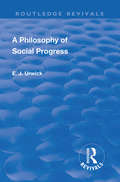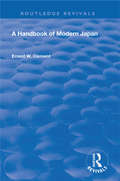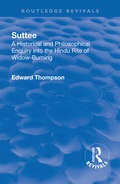- Table View
- List View
Revisiting the Origin of Species: The Other Darwins (History and Philosophy of Biology)
by Thierry HoquetContemporary interest in Darwin rises from a general ideal of what Darwin’s books ought to contain: a theory of transformation of species by natural selection. However, a reader opening Darwin’s masterpiece, On the Origin of Species, today may be struck by the fact that this "selectionist" view does not deliver the key to many aspects of the book. Without contesting the importance of natural selection to Darwinism, much less supposing that a fully-formed "Darwinism" stepped out of Darwin’s head in 1859, this innovative volume aims to return to the text of the Origin itself. Revisiting the 'Origin of Species' focuses on Darwin as theorising on the origin of variations; showing that Darwin himself was never a pan-selectionist (in contrast to some of his followers) but was concerned with "other means of modification" (which makes him an evolutionary pluralist). Furthermore, in contrast to common textbook presentations of "Darwinism", Hoquet stresses the fact that On the Origin of Species can lend itself to several contradictory interpretations. Thus, this volume identifies where rival interpretations have taken root; to unearth the ambiguities readers of Darwin have latched onto as they have produced a myriad of Darwinian legacies, each more or less faithful enough to the originator’s thought. Emphasising the historical features, complexities and intricacies of Darwin’s argument, Revisiting the 'Origin of Species' can be used by any lay readers opening Darwin’s On the Origin of Species. This volume will also appeal to students and researchers interested in areas such as Evolution, Natural Selection, Scientific Translations and Origins of Life.
Revisiting the Yom Kippur War (Israeli History, Politics and Society #Vol. 5)
by P. R. KumaraswamyLooking at the political, military and intelligence components of the Yom Kippur War, this work offers interpretations of Israel's conflict with the Arabs. The contributors, Israeli academics, some involved in the war, make a contribution to the understanding of this part of Israel's history.
Revisiting the Yorkshire Ripper Murders: Histories of Gender, Violence and Victimhood (Palgrave Studies in Victims and Victimology)
by Louise WattisBetween 1975 and 1980, Peter Sutcliffe, who became known as the Yorkshire Ripper, murdered 13 women in the North of England. The murders provoked widespread fear amongst women and impacted the public consciousness at both the local and national level. This book revisits the case, applying a feminist and cultural criminological lens to explore a range of criminological concerns relating to gender, violence and victimhood. Combining research findings from oral history interviews, analysis of popular criminological texts and academic commentary, this volume explores what the case can tell us about feminism, fear of crime, gender and serial murder and the representation of victims and sex workers. The volume contributes to a creative cultural criminology, highlighting how excavating recent criminal history and reading across texts presents new ways for understanding violence, gender and representation in the contemporary context.
Revisualising Intersectionality
by Magdalena Nowicka Elahe Haschemi Yekani Tiara RoxanneRevisualising Intersectionality offers transdisciplinary interrogations of the supposed visual evidentiality of categories of human similarity and difference. This open-access book incorporates insights from social and cognitive science as well as psychology and philosophy to explain how we visually perceive physical differences and how cognition is fallible, processual, and dependent on who is looking in a specific context. Revisualising Intersectionality also puts into conversation visual culture studies and artistic research with approaches such as gender, queer, and trans studies as well as postcolonial and decolonial theory to complicate simplified notions of identity politics and cultural representation. The book proposes a revision of intersectionality research to challenge the predominance of categories of visible difference such as race and gender as analytical lenses.
Revitalising Audience Research: Innovations in European Audience Research (Routledge Studies in European Communication Research and Education)
by Brian O'Neill Frauke Zeller Cristina PonteThe revitalisation of audience studies is not only about new approaches and methods; it entails a crossing of disciplines and a bridging of long-established boundaries in the field. The aim of this volume is to capture the boundary-crossing processes that have begun to emerge across the discipline in the form of innovative, interdisciplinary interventions in the audience research agenda. Contributions to this volume seek to further this process though innovative, audience-oriented perspectives that firmly anchor media engagement within the diversity of contexts and purposes to which people incorporate media in their daily lives, in ways often unanticipated by industries and professionals.
Revitalising Communities in a Globalising World (Contemporary Social Work Studies)
by Lena DominelliRevitalising Communities in a Globalising World explores the opportunities and constraints that the dynamics of globalisation present for human development in a range of different countries and situations. Arguing that globalisation is currently a system of organising social relations along neoliberal lines, this timely volume examines practical examples of how people respond to significant social changes in their communities. The idea of communities is deconstructed to show that globalisation has collapsed the boundaries of time, space and place in ways that have exacerbated inequalities, at the same time giving rise to unparalleled riches for some. The book encompasses a number of case studies that speak to policymakers, practitioners, educators and students interested in studying globalisation and making the most of its potential for change.
Revitalising Critical Reflection in Contemporary Social Work Research, Practice and Education (Routledge Advances in Social Work)
by Christian Franklin Svensson Pia RingøGlobally, social work faces increasingly complex cultural, political, economic, legal, organisational, technological and professional conditions. Critically reflecting on the subject, this book heightens critical consciousness among social work researchers, educators, practitioners and students about the structural dimensions of social problems and human suffering; it highlights the inter-relationship between agency and structure and discusses strategies to challenge and change both individual and societal consciousness. Offering the reader an opportunity to gain in-depth understanding of how critical reflection is possible in contemporary social work research, practice and education, it will be required reading for all social work scholars, students and professionals.
Revitalising Lagging Regions: Smart Specialisation and Industry 4.0 (Regional Studies Policy Impact Books)
This Expo book brings together leading academic and policymaker experts to reflect on the significant challenges faced by lagging regions in participating in the European Union’s Research and Innovation Strategies for Smart Specialisation (RIS3) programme. In doing so, the book offers a set of new policy recommendations on the design and implementation of appropriate Smart Specialisation Strategies (S3) in lagging regions, which may enable them to benefit from the opportunities of digitalisation and Industry 4.0 (I4.0).
Revitalising Rural Communities (SpringerBriefs on Case Studies of Sustainable Development)
by Jessica M. Williams Vivian Chu Wai-Fung Lam Winnie W.Y. LawThis book highlights the challenges and opportunities of (re)constructing a sustainable rural community on the outskirts of the urban community. Based on knowledge and experience accumulated through implementing a rural revitalisation project in Hong Kong since 2013, the book provides an in-depth analysis of a case study along with related concepts from the literature. In particular, the concept of rural resilience is broken down and used to examine how communities at the urban-rural interface can leverage their position and connections to (re)create vibrant sustainable communities. The revitalisation project was showcased in the databases of the United Nations Development Programme (UNDP)’s Equator Initiative and the International Partnership for the Satoyama Initiative (IPSI) as well as achieving Special Recognition for Sustainable Development in the UNESCO Asia-Pacific Awards for Cultural Heritage Conservation in 2020. This book teases out the key issues in the process of revitalising a rural community in the peri-urban context and examines the complexities embedded in each issue and how they can be addressed in the quest for rural sustainability.
Revitalization and Internal Colonialism in Rural Japan (Japan Anthropology Workshop Series)
by Timo ThelenThis book explores the decline of rural and peripheral areas in Japan, which results from an aging population, outmigration of the younger generations, and the economic decline of the primary sector. Based on extensive original research, the book examines in detail the case of the Noto peninsula. Allowing the locals to tell their stories, describe their problems, and come up with possible solutions, the book demonstrates the serious impact of rural decline on their daily life and work and highlights the struggle to sustain rural living in the globalized age. It argues that some recent innovations in global media, economy, technology, and ideology offer scope for reversing the decline, as some central government initiatives do, but that these are not always noticed, appreciated, and made use of by local people. The book also discusses the nature of the links between the peripheries and the centres – regional, national, and global – and how these often take the form of "internal colonialism."
Revitalizing Arts Education Through Community-Wide Coordination
by Laura Zakaras Catherine H. Augustine Susan J. BodillyInitiatives to coordinate schools, cultural institutions, community-based organizations, foundations, and/or government agencies to promote access to arts education in and outside of schools have recently developed. This study looks at the collaboration efforts of six urban communities: how they started and evolved, the kinds of organizations involved, conditions that helped and that hindered coordination, and strategies used.
Revitalizing Causality: Realism about Causality in Philosophy and Social Science (Routledge Studies in Critical Realism)
by Ruth GroffThis cutting edge collection of new and previously published articles by philosophers and social scientists addresses just what it means to invoke causal mechanisms, or powers, in the context of offering a causal explanation. A unique collection, it offers the reader various disciplinary and inter-disciplinary divides, helping to stake out a new, neo-Aristotelian position within contemporary debate.
Revitalizing Criminological Theory: Advances in Ultra-Realism (New Directions in Critical Criminology)
by Steve Hall Simon WinlowThe second edition of Revitalizing Criminological Theory is a substantial revision and expansion of the first edition. Ultra-realism is a unique school of criminological thought currently establishing itself in the discipline despite resistance from traditional schools. The second edition still provides the undergraduate and postgraduate student reader with an invaluable guide to existing schools of thought and their roots in politics and philosophy, but with updated commentary on their intellectual flaws.In the first edition, Hall and Winlow introduced a number of important new concepts that laid the foundations for an alternative theoretical framework and research programme in criminology. In three additional chapters written specially for this edition, they introduce further concepts and substantive revisions to the theoretical framework. They also outline and discuss in detail the growing body of award-winning criminological projects conducted by a new generation of researchers who have adopted and mobilised ultra-realist thinking over the past ten years. During this period of time, ultra-realism has also made significant progress towards its primary objectives of understanding human motivations, constructing insightful representations of reality and answering the fundamental zemiological question of why some human beings risk inflicting harm on others to further their own interests or achieve various ends. The philosophical and psychosocial approaches outlined in the first edition are now significantly advanced and able to offer a more detailed answer to this question and a convincing alternative to the traditional paradigms of conservatism, neoclassicism and left liberalism. Ultra-realism is now in a position to make some substantive contributions to the debate on the depth of political intervention required to get serious about reducing the impact of crime and harm on the lives of ordinary people.This book is essential reading for academics and students engaged in the study of criminology, sociology, social psychology, the philosophy of social science and the history of crime.
Revitalizing Criminological Theory: Towards a new Ultra-Realism (New Directions in Critical Criminology)
by Steve Hall Simon WinlowThis book provides a short, comprehensive and accessible introduction to Ultra-Realism: a unique and radical school of criminological thought that has been developed by the authors over a number of years. After first outlining existing schools of thought, their major intellectual flaws and their underlying politics in a condensed guide that will be invaluable to all undergraduate and postgraduate students, Hall and Winlow introduce a number of important new concepts to criminology and suggest a new philosophical foundation, theoretical framework and research programme. These developments will enhance the discipline’s ability to explain human motivations, construct insightful representations of reality and answer the fundamental question of why some human beings risk inflicting harm on others to further their own interests or achieve various ends. Combining new philosophical and psychosocial approaches with a clear understanding of the shape of contemporary global crime, this book presents an intellectual alternative to the currently dominant paradigms of conservatism, neoclassicism and left-liberalism. In using an advanced conception of "harm", Hall and Winlow provide original explanations of criminal motivations and make the first steps towards a paradigm shift that will help criminology to illuminate the reality of our times. This book is essential reading for academics and students engaged in the study of criminology, sociology, criminological theory, social theory, the philosophy of social sciences and the history of crime.
Revitalizing European Rituals (Routledge Revivals)
by Jeremy BoissevainFirst published in 1992, Revitalizing European Rituals explores why revitalization of celebrations is taking place in communities throughout Europe. The festive behaviour appears to contradict the sober, rational conduct associated with modernization and industrialization. The contributors examine fairs, carnivals, fiestas, Holy Week, and national rituals in Britain, Poland, Spain, Italy, Malta and Greece. They have lived and worked in the communities they describe, celebrated the festivities they analyse, and have discussed them with the celebrants.The underlying reasons for the revival are complex and examined fully. The conclusions provide surprising insights into the changes sweeping across Europe. This book will be valuable reading for researchers and lecturers in social anthropology, sociology, religious studies, cultural studies, and tourism.
Revitalizing Health for All: Case Studies of the Struggle for Comprehensive Primary Health Care
by David Sanders Corinne Packer International Development Research Centr Nikki Schaay Ronald LabontéThe concept of Comprehensive Primary Health Care focuses on health system efforts to improve equity in health care access, community empowerment, participation of marginalized groups, and actions on the social determinants of health. Despite its existence since the late 1970s very few studies have been able to highlight the outcomes of this concept, until now. Revitalizing Health for All examines thirteen cases of efforts to implement CPHC reforms from around the globe including Australia, Brazil, Democratic Republic of Congo, Iran, South Africa, and more. The findings presented in this volume originate from an international action-research set of studies that utilized triads of senior and junior researchers and knowledge users from each country’s public health system. Primary health care reform is an important policy discourse both at the national level in these countries and in the global conversations, and this volume reveals the similarities among CPHC projects in diverse national contexts. These similarities provide a rich evidence base from which future CPHC reform initiatives can draw, regardless of their country.
Revitalizing Minority Languages: New Speakers of Breton, Yiddish and Lemko (Palgrave Studies in Minority Languages and Communities)
by Michael HornsbyNew speakers are an increasingly important aspect of the revitalization of minority languages since, in some cases, they can make up the majority of the language community in question. This volume examines this phenomenon from the viewpoint of three minority languages: Breton, Yiddish and Lemko.
Revitalizing Victimization Theory: Revisions, Applications, and New Directions (Advances in Criminological Theory)
by Travis C. PrattRevitalizing Victimization Theory: Revisions, Applications, and New Directions revises some of the major perspectives in victimization theory, applies theoretical perspectives to the victimization of vulnerable populations, and carves out new theoretical territory that is clearly needed but has yet to be developed. With the exception of a handful of isolated works in the mid-twentieth century, theory and research on victimization did not come into its own until the late 1970s with the articulation of lifestyle and routine activity theories. Research conducted within this tradition continues to be an important part of the overall criminological enterprise, and a large body of empirical knowledge has been generated. Nevertheless, theoretical advances in the study of victimization have largely stalled within the field of criminology. Indeed, little in the way of new theoretical headway has been made in well over a decade. This is an ideal time to revitalize victimization theory, and this volume does just that. It is an ambitious project that will hopefully reignite the kinds of theoretical discussions that once held the attention of the field. The work included here will shape the future of victimization theory and research in years to come. This volume should be of interest to a wide range of criminologists and have the potential to be used in graduate seminars and upper-level undergraduate courses.
Revival (2001): Towards a Deconstructionist Theory
by Ben ChiagraThis title was first published in 2001. A discussion of customary international law (CIL). Throughout the study particular values are examined for their potential effect on the legitimacy of the process of custom. The writer argues that, in order to achieve legitimacy enhancing transparency in the process of custom, it must be acknowledged first that the power applied by international tribunals when they inaugurate new norms of customary international law always creates categories of "dominance" and "subservience", "inclusion" and "exclusion". Such an acknowledgement would foster a situation where both the power applied by tribunals and the manner in which it is applied, can legally be scrutinized for excesses that limit first the transparency of the process of custom, and second the legitimacy of norms of customary international law.
Revival Movements as Conflict Agendas of the Popular in the Nineteenth and Early Twentieth Centuries
by Veronika Albrecht-Birkner Stefanie Siedek-StrunkThis open access book focuses on the potential for conflict between high and low culture during the transformations of the popular in the field of religion in the nineteenth and early twentieth centuries. Specifically, the contributors to this edited collection consider the so-called 'Revival Movements' that came up as a symptom of differentiation and pluralisation of Protestantism in reaction to the Enlightenment, rationalism, and criticism of religion, and explore the attempts at theological self-empowerment of Christian laymen and laywomen.
Revival of the Runes: The Modern Rediscovery and Reinvention of the Germanic Runes
by Stephen E. Flowers• Explores the five periods of runic revival: the Renaissance, the Enlightenment, the Romantic period, the early 20th century, and the late 20th century • Examines the use of runes by the foremost magicians and scholars of each era, including mystic and scholar Johannes Bureus, who developed his own integrated system of runology known as Adalruna • Reveals how the Nazi misguided use of the runes showed a lack of comprehension of what was being discovered by scientific rune scholars of the day In this exploration of the history of the runes from 1500 CE to the present day, Stephen Edred Flowers examines the five periods of runic revival: the Renaissance, the Enlightenment, the Romantic period, the early 20th century, and the late 20th century. For each period, he discusses both the scholarly studies and those focused on the esoteric mysteries of the runes--and how these two branches of study were at first intertwined yet diverged in later revivals. Focusing in particular on the first runic revival, Flowers examines the use of runes during the Renaissance by the foremost magicians and scholars of the era, including mystic and scholar Johannes Bureus, the &“grandfather of integral runology,&” who developed his own system known as Adalruna. In his examination of the runic reawakenings of the early and late 20th century, Flowers looks at how the runes were employed as part of a reassessment of Germanic identity, one school of which led to Nazi Germany. He explains how the Nazi use and abuse of the runes was misguided and revealed a lack of comprehension of what earlier rune scholars had discovered through their extensive studies of the past. He also offers a fresh look at the work of Guido von List and clears him of his guilt by association with the Nazis. Detailing the multilayered history of the runes, the author reveals the integrated way the predecessors of today&’s rune workers thought and conceived of the runes, highlighting how their discoveries helped shape modern magical practices and scholarly studies. He calls for a return of integral runology as was practiced during the Renaissance and before. By reuniting the two branches of runic study, blending the scientific with the magical, we make way for new discoveries in runology and a chance for a full-scale reawakening of integrated runic knowledge.
Revival: 1600-1935 (Routledge Revivals #5)
by Arthur Berriedale KeithThis book, first published in 1926, provides a comprehensive description and analysis of every constitutional aspect of British rule in India from 1600 to 1936. Beginning with a description of the East India Company before Plassey, its constitution, administration of settlements, and relation to the Indian states, the book closes with an account of the reforms of the 1930s, the events leading up to the White Paper and an analysis and elucidation of the Government of India Act 1935.
Revival: 2nd Edition (Routledge Revivals)
by Edward Johns UrwickThis book was originally written with a double purpose; The first reason was to introduce students to a conception of a social philosophy which should be definitely linked to modern sociology, and not to be treated as a mere outgrowthof the older physical philosophy. The second reason, was to establish a new position in regard to the philosophical conception of social change – a position in opposition to that usually assumed both by the sociologist and by the philosopher.
Revival: A Handbook of Modern Japan (Routledge Revivals)
by Ernest W. ClementIn this book the author has intended to portray Japan as he finds it rather than as it was in the past. However, the past is not ignored as it would be both foolish and futile. It is noted whilst there are no parts of Japan, and very few of her people, entirely unaffected by the new civilization, yet there are still some segments which are comparatively unchanged by the new ideas and ideals. It is observed that although those who have been least affected by the changes are more in number than those who have been most influenced by the change, yet the latter are much more active and powerful than the former.
Revival: A Historical and Philosophical Enquiry Into the Hindu Rite of Widow-Burning (Routledge Revivals)
by Edward John ThompsonI suppose the impulse to write this book dates back to my shame and anger in India when men and women of my own race extolled suttee, and the amazement with which I first saw the memorials of Hindu kings, with the sati’s couching forms. But the impulse was slight, and would have slept but for a publisher’s interest. Messrs. Allen & Unwin passed on to me questions asked about suttee by their reader when reporting on my share in Three Eastern Plays. Receiving my reply, they suggested that I should right on this subject.
